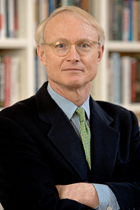Harvard Professor Michael Porter Honored by U.S. Department of Commerce
 Professor Michael E. Porter
Professor Michael E. Porter
BOSTON — Michael E. Porter, Harvard's Bishop William Lawrence University Professor based at Harvard Business School, has received the first Lifetime Achievement Award in Economic Development from the U.S. Department of Commerce. The award was presented on May 22 by U.S. Secretary of Commerce Carlos Gutierrez and Assistant Secretary Sandy K. Baruah at the 2008 National Summit on American Competitiveness in Chicago. The Lifetime Achievement Award is presented only rarely, when a private citizen's body of work and assistance to the federal government have significantly enhanced the nation's approach to economic development. According to the U.S. Department of Commerce, "Michael Porter's work on competitiveness and industry clusters has significantly shaped the federal approach to economic development, including the rejuvenation of the Commerce Department's Economic Development Administration (EDA); thought leadership of a comprehensive proposal to streamline the federal delivery of community and economic development programs; and support for Free Trade Agreements." Accepting the award, Porter, often referred to as the world's leading expert on the competitiveness of companies and countries, said, "It has been a privilege to work with Secretary Gutierrez, his predecessors, and their colleagues to enhance Federal policy toward economic development. The combination of active and autonomous states and regions working with Federal support is one of the unique competitive advantages of the American economy." Porter is the author of 17 books and more than 125 articles. These publications, including Competitive Strategy and Competitive Advantage, have reshaped the way company strategy is taught and practiced. His work on competitiveness, including his book The Competitive Advantage of Nations, which introduced the influential concept of "clusters" (geographic concentrations of related industries in particular fields), has guided economic policy across the world. Porter has advised leaders in many nations and is currently working in Colombia, Rwanda, Saudi Arabia, and Vietnam. He has also dedicated more than a decade of work to America's economically distressed communities. In 1994, he founded and remains chair of The Initiative for a Competitive Inner City (ICIC), a nonprofit private-sector organization that catalyzes inner-city business development across the United States and that has collaborated actively with EDA and city governments. Porter's most recent book, Redefining Health Care: Creating Value-Based Competition on Results, published in 2006, puts forth a strategy for the transformation of the health care delivery system in the United States and abroad. The book was honored with the James A. Hamilton Award as the outstanding health care book of the year. At Harvard, Porter's graduate course on competitiveness is taken by students from across the entire university. It is also taught in partnership with more than 80 other universities, many of them in developing nations. He also leads the New CEO Workshop, a Harvard Business School program for newly appointed CEOs of the world's largest and most complex organizations. Porter earned an MBA from Harvard Business School with high distinction as a George F. Baker Scholar in 1971 and a Ph.D. in Business Economics from Harvard University in 1973, where he won the Wells Prize for his research in industrial organization. He is a 1969 graduate of Princeton University, where he graduated with high honors in aerospace and mechanical engineering and was elected to Phi Beta Kappa and Tau Beta Pi. The holder of 14 honorary doctorates and numerous other awards and national honors, he was named a University Professor in 2000, the highest professional recognition that can be awarded to a Harvard faculty member. |
About Harvard Business School
Harvard Business School, located on a 40-acre campus in Boston, was founded in 1908 as part of Harvard University. It is among the world's most trusted sources of management education and thought leadership. For more than a century, the School's faculty has combined a passion for teaching with rigorous research conducted alongside practitioners at world-leading organizations to educate leaders who make a difference in the world. Through a dynamic ecosystem of research, learning, and entrepreneurship that includes MBA, Doctoral, Executive Education, and Online programs, as well as numerous initiatives, centers, institutes, and labs, Harvard Business School fosters bold new ideas and collaborative learning networks that shape the future of business.
